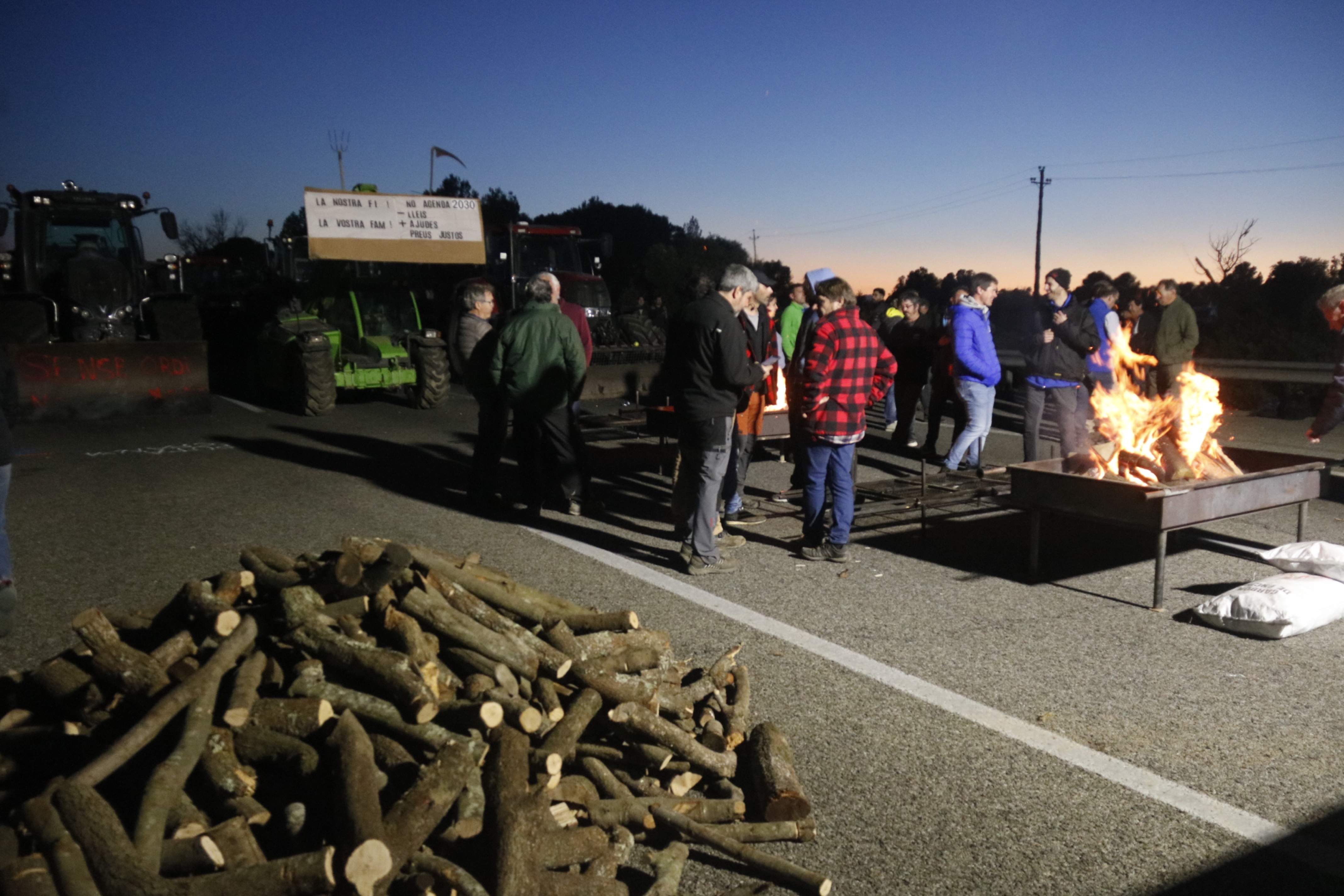Catalan farmers will keep up their blockades and protests on the main north-south motorway, the AP-7, until they get commitments from the Catalan and Spanish governments, as announced this Tuesday evening by the spokesperson for the Union of Farmers and the Revolta Pagesa ("Farming Revolt") movement, Jordi Ginebreda. Thus, more than 300 farmers from the northern Girona area will spend the night at the blockade they put in place this Tuesday morning on both the AP-7 and the parallel north-south route, the N-2, near Pontós (Alt Empordà county), having reached an agreement with the Mossos d'Esquadra police that they will not be dislodged. Beyond building barricades and burning tyres, those attending the protest have set up barbecues to feed themselves. Meanwhile, another group of protesting farmers will be spending the night at the Port of Tarragona and inland, further blockades of the C-17 and C-25 motorways were to continue until midnight.
The major protests by farmers in Catalonia and elsewhere in the Spanish state have now entered a second week. Calling for measures to arrest the long-term economic suffocation of the sector, among other demands, the farmers began a new round of protests this Tuesday morning. The blockage of the AP-7 and the N-2 in the north of Catalonia started at 9:30am this morning. Farmers gathered on the highways, cutting traffic in both directions, and brought logs, tyres and other debris to make barricades, thus reinforcing a blockade that had begun with dozens of tractors obstructing the route. Many also parked in a nearby field, where protesters set up a camp and played music through loudspeakers. In the afternoon, they set up grills on the road to cook meals: brou (broth) and barbecued meat were on the menu. The protesters had come prepared with tents and mattresses, which they put inside some of the trailers.
Ginebreda explained that they have met several times with the Mossos police and that it has been agreed that they will not be evicted. "Everyone will remain calm and we will continue the blockade, because we know that there are talks happening with the Generalitat of Catalonia and the government in Madrid with the intention of making commitments that will ease tensions", he stated. Thus, he asserted that the tractors will continue to block the AP-7 and the N-2 until the administrations make a move: "As soon as there is something on the table and they tell us, we will hold a new assembly to decide what we do and how the negotiations for the demands we have will be dealt with. Based on what we are told we make our minds up, but if we are only given some chocolate, I'm sure we won't leave."
The first things that the Girona farmers are asking for is a direct meeting with the Spanish agriculture minister, Luis Planas. But, in general, Ginebreda said that what they want are "answers" to the grievances that have been steadily blighting the sector, including too much bureaucracy, drought relief, and other economic assistance. "We are drowning economically, even though there is no water at present," he joked. That is why he asked for no one to move: "We won't move, we have the tractors well placed and until they give us commitments, our position is to hold on." "If we move, we lose negotiating power, and what we want are answers from both Barcelona and Madrid," he added. In fact, the spokesperson asked farmers from other points such as Vic or Lleida to come with tractors to maintain the highway blockades.
Port of Tarragona paralysed for 24 hours
Around 5pm, the protests in the Girona regions had led to three-kilometre lines of traffic on the AP-7 between Medinyà (Gironès) and Vilademuls (Pla de l'Estany) and another four kilometres on the N-2 between Vilademuls and Bascara (Alt Empordà), with most of the stopped vehicles being trucks, and the Mossos diverting traffic away from the blocked highways.
Meanwhile, in the south of Catalonia, the farmers who have blocked the entrance to the Port of Tarragona since this Tuesday morning have also decided to extend their protest for a minimum of 24 hours. The decision was taken at noon, in an assembly with farmers from Camp de Tarragona, Terres de l'Ebre and the counties of Lleida, and with around 500 tractors. After the meeting they made lunch and set up in the middle of the A-27 with tables, chairs and barbecues. From around 4:30pm until 7:30pm, a hundred farmers also decided to block the road crossing the Francolí industrial estate in Tarragona, as well as a section of the N-340 near the Icomar neighbourhood.
Main image: Girona farmers get ready to spend the night on the AP-7 setting up grills for dinner/ ACN

